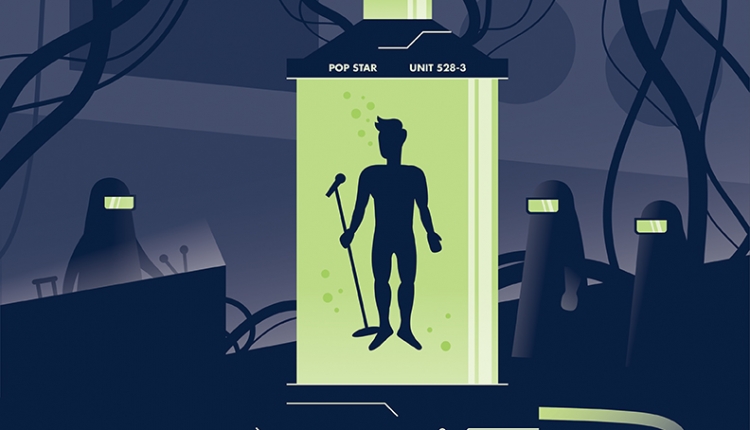
“We all know that art is not truth – art is a lie that makes us realize truth.” – Pablo Picasso
2017 seems set to go down in history as the year when nobody really knew for sure what was real. Fake news, speculation, spin—every day seems to be an all-out assault on our perception of reality, further eroding our collective confidence in pretty much everything. We even have a name for people who don’t believe the Earth is round. Because, you know, there are enough of them now. In fact, the only thing the entire world seems to have in common right now is the knowledge that someone, somewhere is lying to them, trying to make them forget what is real and what is not. Which is why many have already dubbed this time in our history as the age of post-truth. But how will artists respond to these uniquely modern times?
 Frankly, there’s only one band perfectly suited for these times, because they’re the only band unburdened by truth, and far better off for it. That band is of course Gorillaz, the animated pop-group and brain child of co-founders Damon Albarn (of Blur fame) and Jamie Hewlett (artist and creator of “Tank Girl”). As of April of this year, the duo broke their seven year hiatus to release the band’s latest full-length album Humanz, an album truly as innovative as the animated band itself. Featuring some of modern hip-hop’s most prolific artists, such as Popcaan, D.R.A.M. and Pusha T, the album masterfully blends the most exciting sounds of our time while pushing boundaries nobody ever knew existed. The only way to really describe this album is to say that you’ve never heard an album like this before. Just like the era of post-truth we all now find ourselves navigating, everything feels familiar yet distant at the same time. Like hopping out of a time-machine fifty years in the future—all the buildings look the same but the faces have changed.
Frankly, there’s only one band perfectly suited for these times, because they’re the only band unburdened by truth, and far better off for it. That band is of course Gorillaz, the animated pop-group and brain child of co-founders Damon Albarn (of Blur fame) and Jamie Hewlett (artist and creator of “Tank Girl”). As of April of this year, the duo broke their seven year hiatus to release the band’s latest full-length album Humanz, an album truly as innovative as the animated band itself. Featuring some of modern hip-hop’s most prolific artists, such as Popcaan, D.R.A.M. and Pusha T, the album masterfully blends the most exciting sounds of our time while pushing boundaries nobody ever knew existed. The only way to really describe this album is to say that you’ve never heard an album like this before. Just like the era of post-truth we all now find ourselves navigating, everything feels familiar yet distant at the same time. Like hopping out of a time-machine fifty years in the future—all the buildings look the same but the faces have changed.
First thing’s first, let’s be clear: just like these times we now find ourselves in, this album is not suited for everyone. Humanz is confusing and disjointed. There are no guitars. There is no “lead” singer, no one person in charge. It appeals only to those who chase the future with an excited curiosity, to those ready to dismiss everything they already know in an attempt to embrace a strange new landscape. And it’s for those reasons I’m not going to try to convince you to listen to Humanz. What I’m here to convince you of is that during the age of post-truth, it’s officially time to stop dismissing Gorillaz as nothing more than a cartoon.
Gorillaz are cartoons in as much as Animal Farm was a book about animals and farming. Ever since Gorillaz released their 2005 masterpiece (a term I’ve never used lightly) Demon Days, I’ve been on something of a mission to convince my peers of this. Because there’s a very real depth to those four animated characters easily overlooked by those who’ve never bothered to look, a narrative washed over by what many consider nothing more than a clever marketing scheme.
Conceived in 1998 while Albarn and Hewlett both shared a London flat, Gorillaz were created as a direct response to the vapidity of the post-Britney MTV pop music industry. The main thought being ‘if all pop stars are fake, and everyone knows they’re fake, then why not just go all the way?’ And thus Gorillaz were formed, with Hewlett overseeing all visual elements of the band and Albarn employing his re-discovered anonymity to explore truly brand new sounds. Gorillaz are a pure work of modern art highlighting ‘the masses’ obsession with trend and aversion to substance. Masters of irony as they are, Gorillaz success managed to prove several things: that we, as the audience, are so disconnected from the stars we idolize that four cartoon characters can feel just as real as living, breathing human beings living somewhere in Los Angeles. Even more ironically, that a “fake” band can release work of more importance and substance than some of pop music’s most towering figures, perhaps because they are not real, rather than in spite of it.
The strange reality is that everything that makes for an interesting pop figure—visuals, attitude, narrative—are the very things that make Gorillaz better suited for pop industry success than their substantially more fallible human peers. Gorillaz never age. Gorillaz don’t make mistakes or public gaffes. Gorillaz never have to appear in court or defend their tweets or have a bad hair day. Gorillaz have achieved what all pop stars since Elvis have attempted: to become something more than human. After all, what’s really the difference between Photoshopping pop stars beyond the point of reality and just creating one out of the ether? If the only way we interact with our idols is through still photos, YouTube videos and carefully crafted Facebook posts, at what point does being “real” become unnecessary? Why do we concern ourselves with the messenger when the message is all that should matter?
Gorillaz are not truth. Gorillaz are a lie that makes us realize truth. And if that is the case, Gorillaz are no less artists than Picasso himself.
Illustration by Dan Dinsmore

